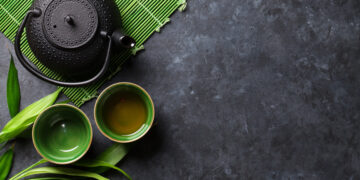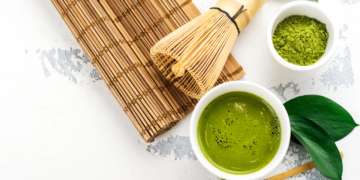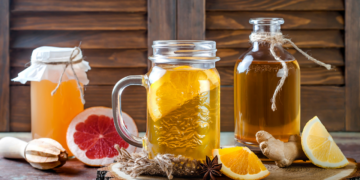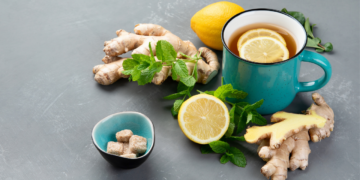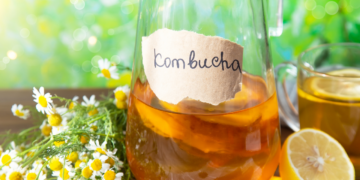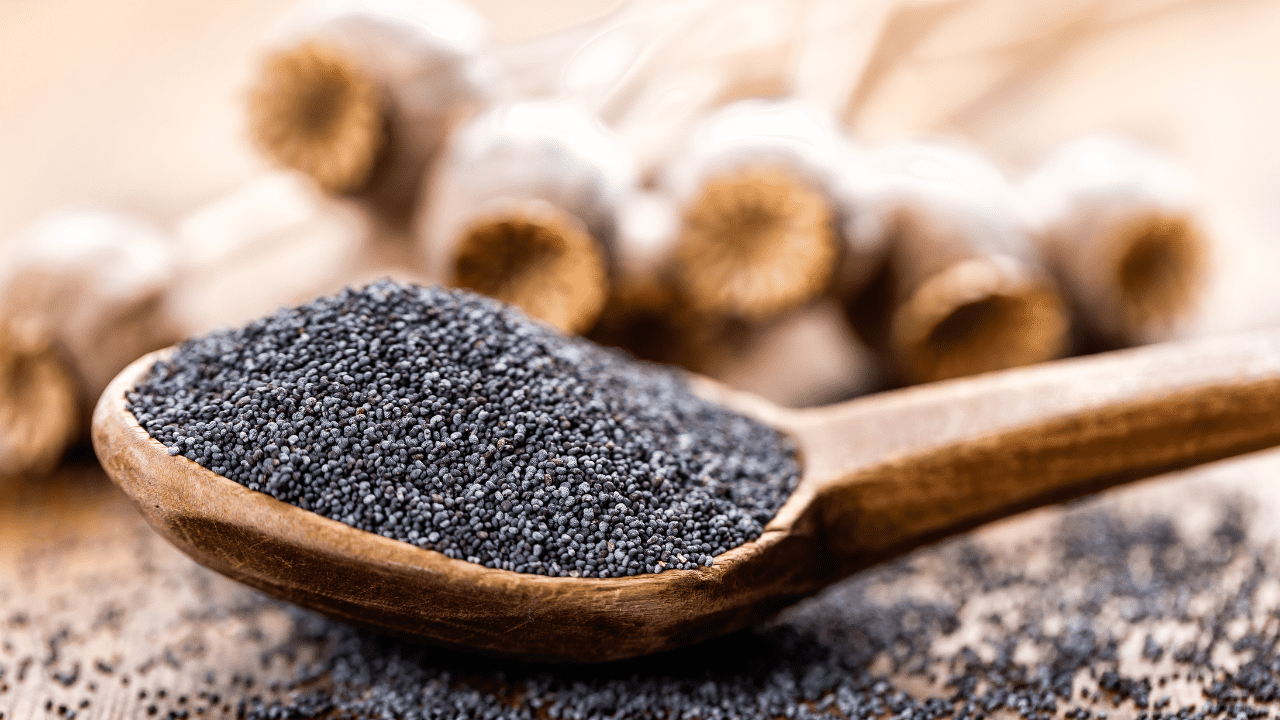Jasmine tea is a delicious, delicate-tasting drink. A tea made by infusing jasmine blossoms into a tea base, it’s best enjoyed sitting by a window, watching the world go by.
But as with many teas, the caffeine content of jasmine tea can be a concern. And while caffeine generally exists in jasmine tea due to the tea being commonly made with green, white, or black tea as its base, the caffeine content can vary massively from cup to cup.
So, take a look at our guide to jasmine tea caffeine levels, and find out exactly how much is in a cup of tea – and how it could compare to other drinks.
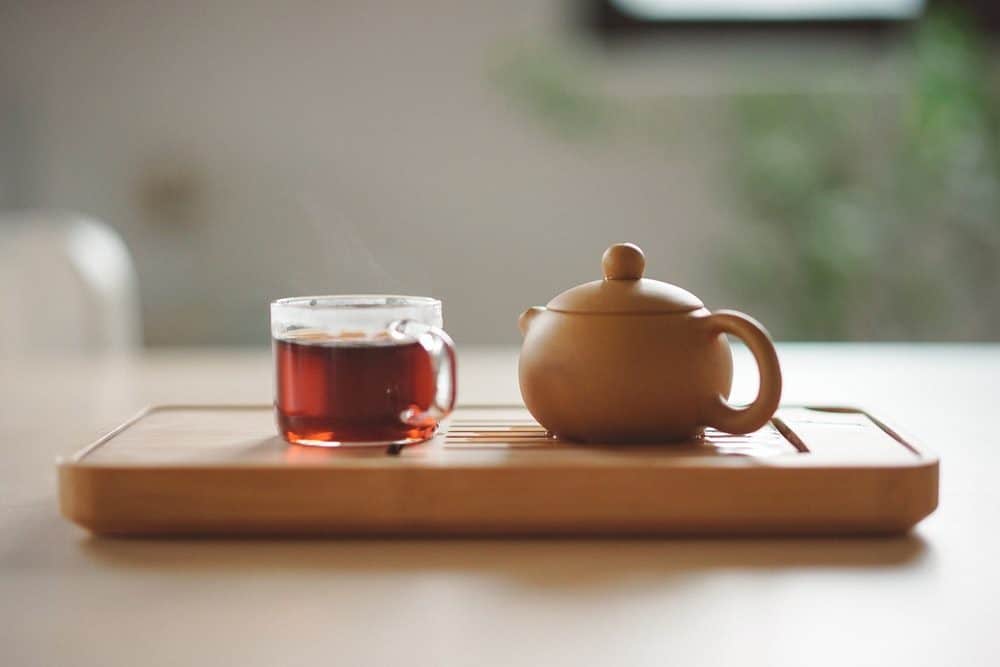
What Exactly Is Jasmine Tea?
With a history stretching back to the fifth century, jasmine tea is a popular traditional tea that is drunk across China and other nations in the East. Jasmine tea is a tea made of a base of green tea leaves, black tea leaves, oolong tea leaves, or white tea leaves (or any of the other tea variants derived from the camellia sinensis plant) and scented with jasmine flower blossoms by infusing them into the drink, creating a subtly floral flavor.
Jasmine tea is traditionally served as a drink to welcome guests in Chinese culture and has strong cultural connotations. As the jasmine flower is one of the holy flowers of Buddhism, it’s thought to have heavenly connotations – and it’s also the flower that symbolizes eternal love (just to be aware, before it’s served up accidentally to a crush!).
Jasmine teas are often mistaken as a herbal tea, due to its jasmine content – but this isn’t the case. This is due to the fact that it is made with a base from the camellia sinensis plant – and therefore has a caffeinated tea base made from leaves. Herbal teas, on the other hand, are not made from tea leaves.
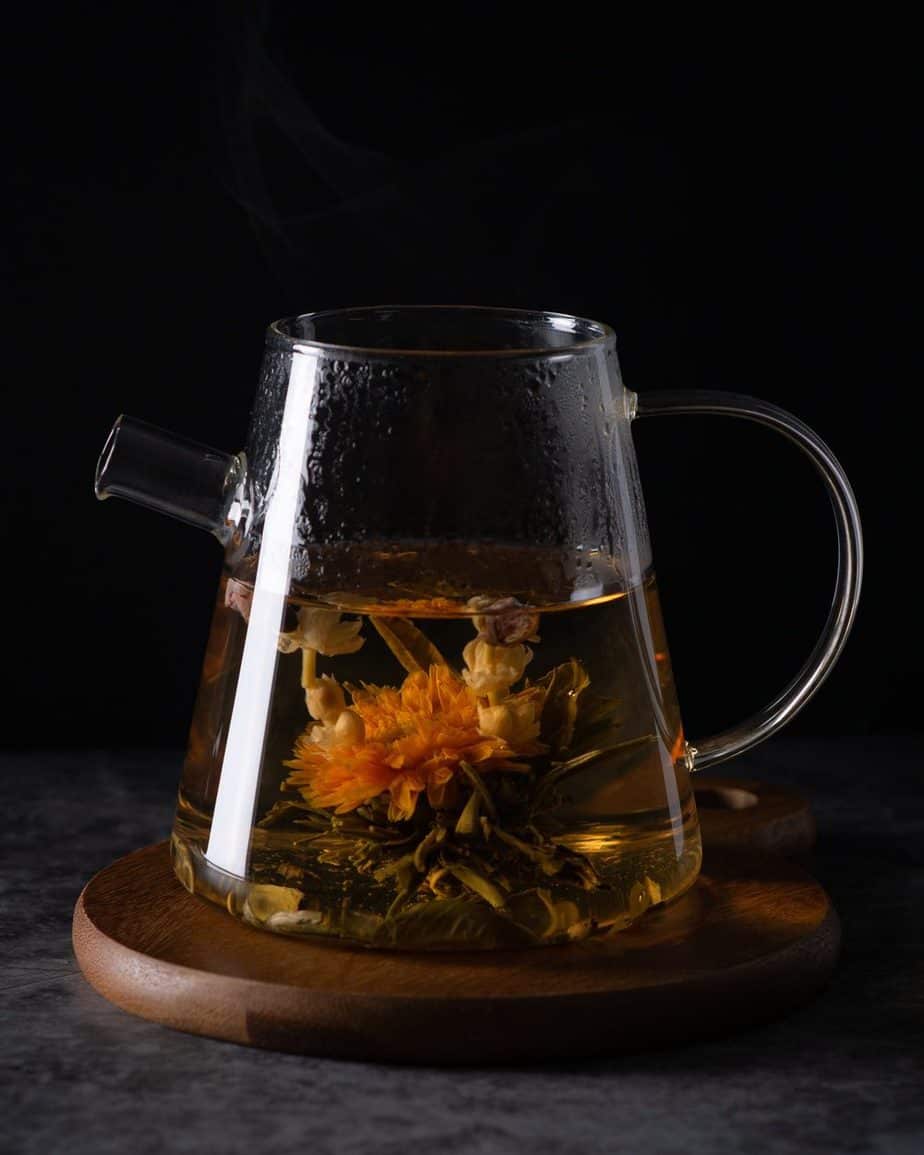
What’s The Caffeine Content Of Jasmine Tea?
The caffeine content of jasmine tea varies depending on the tea base used and how long it’s steeped for – but all types will have some amount of caffeine in them, and it could vary from anywhere between 15-90mg of caffeine per cup of tea.
Jasmine tea is traditionally made using a green tea base, which gives it a delicate, herbal flavor. With a base of green tea the average cup of jasmine tea will contain around a 25-50mg caffeine level for an 8-oz cup. This will be slightly less for white tea, as it is generally less caffeinated – and slightly more for oolong tea.
Jasmine tea made with a black tea base will generally have the highest caffeine content, with jasmine blends made with black tea weighing in with around a 45-70mg caffeine content. It can be much stronger, though – but this depends, again, on how long it’s steeped, as well as the ratio of black tea leaves to jasmine.
Jasmine Tea Vs. Green Tea
As jasmine tea is often made with green tea as a base, it might feel like comparing the caffeine content of the two seems strange – surely it’s just the same, right?
Well, not quite – but there’s not a huge amount of difference between them. The main thing to remember is that blends of green teas, and jasmine tea with a base of green tea, will tend to be the same in caffeine, with maybe a few mg’s between them at a base level. However, as jasmine tea has a stronger floral flavor, people can tend to use less tea leaf for each cup, leading to it having less caffeine present.
In addition, jasmine tea can sometimes be steeped for a little less time than an average green tea, again due to its flavor being stronger, requiring less soaking time. As such, the caffeine content comes down not so much to the amounts of caffeine in different blends, but more in the preparation.
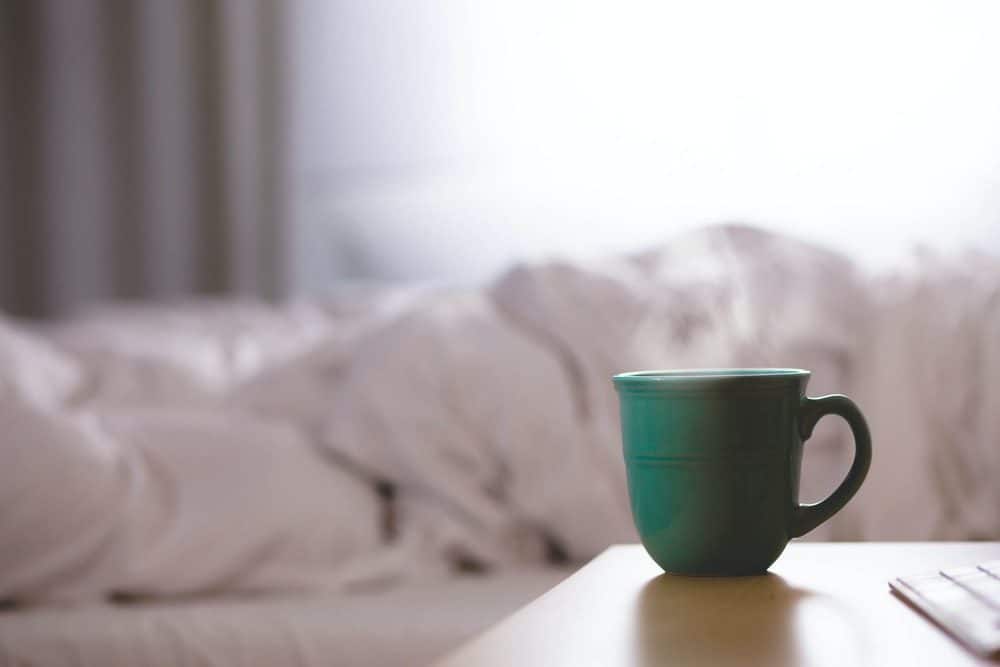
Comparing Different Brands Of Jasmine Green Tea For Caffeine
Different brands of jasmine green tea will contain different base levels of caffeine, due to variations in the strength of the leaf used, and the type of tea used as a base.
But which has the most? Well, luckily we’ve put together the information for 5 of the biggest brands out there today, to help make a choice.
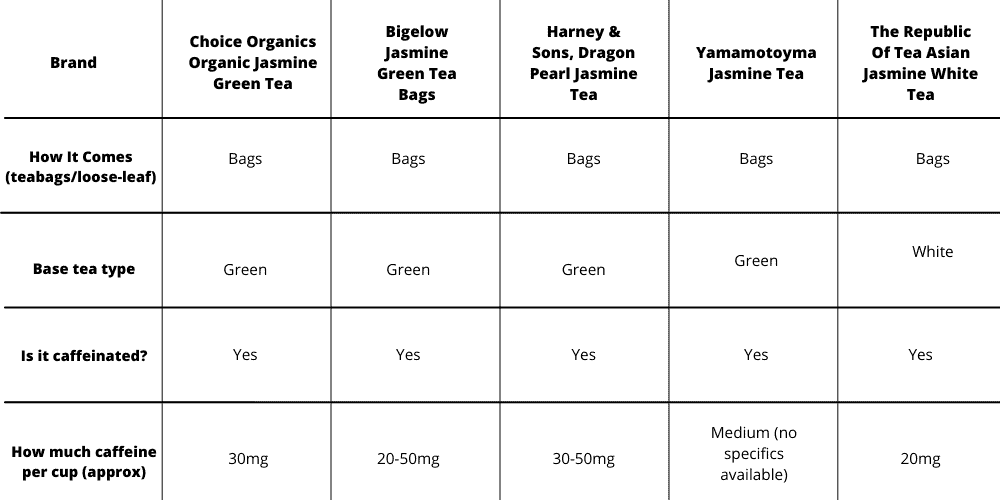
As shown here, all of the types of tea we’ve listed contain a similar level of caffeine content – apart from, of course, The Republic Of Tea Asian Jasmine White Tea, which has a white tea base and so is less caffeinated. These teas are available to order on any good shopping sites – so try them out today.
It’s worth pointing out, though, that with all of these teas, a longer brew time will make it stronger and so heavier in caffeine, due to the tea leaves being able to impart more caffeine into the liquid through the infusion.
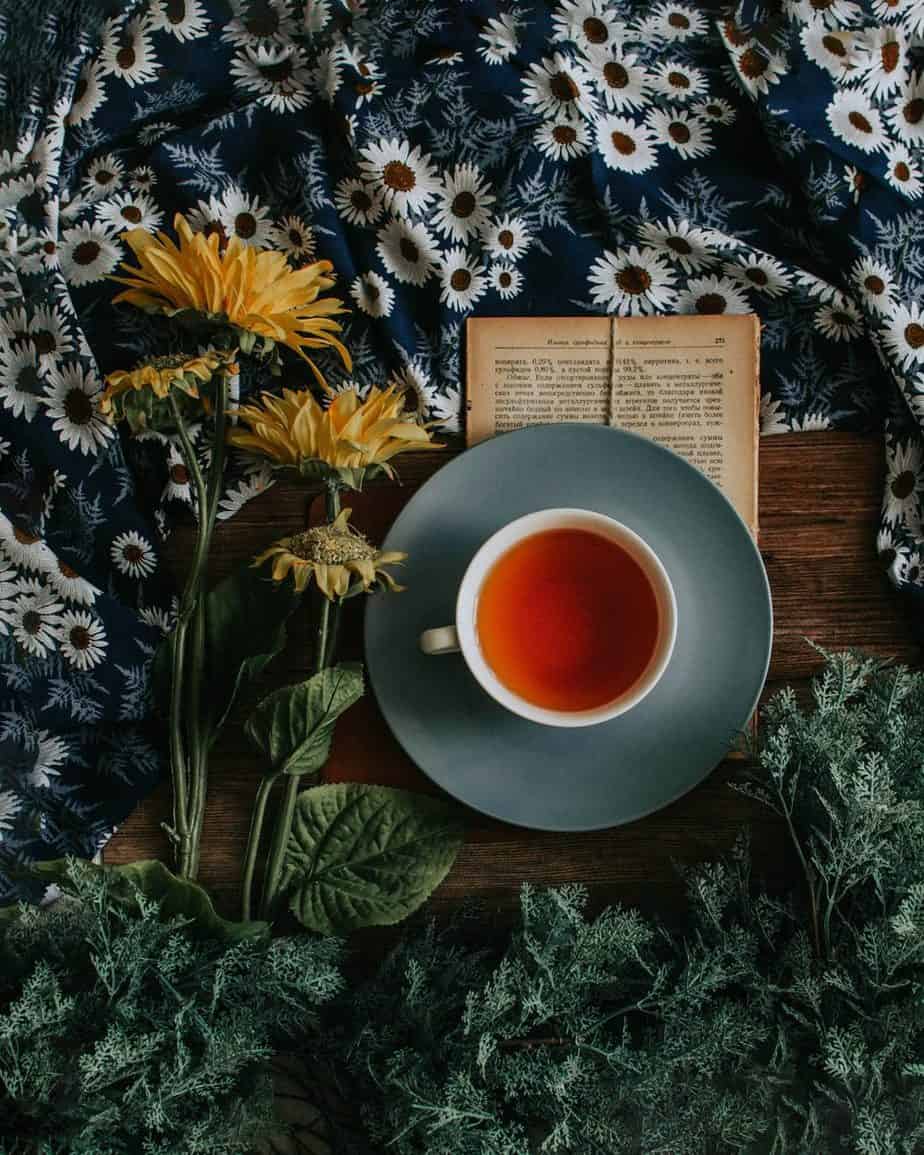
Caffeine Content In Jasmine Tea Vs. Other Beverages
For the caffeine-conscious, it’s useful to take a look at how jasmine tea stacks up to other beverages, to help make the right choice for a morning or afternoon drink.
Other Teas
Generally, due to jasmine tea being made with a base tea like green, black, or white, the amount of caffeine in each cup will be roughly equivalent to a cup of the same tea without jasmine, if prepared in the same way.
So:
- For green tea, this is usually somewhere between 20-50mg;
- With black tea, this is usually around 45mg-70mg;
- With white tea, it’s 15-39mg;
- And for oolong tea, it’s 15-60mg.
However, it’s useful to remember that jasmine tea may be steeped for less time or people may use less of it to make a cup due to its floral notes, and the less leaf used, the less caffeinated it will be.
Coffee
Coffee’s reputation for being a drink that helps us get up and go is well-founded due to its caffeine content – and compared to jasmine tea, coffee will usually come in considerably stronger.
The average 8oz. cup of brewed coffee will contain around 95mg of caffeine – although if opting for instant coffee, it can be slightly less, coming in at around 60mg. Either way, both of these are higher than the average cup of jasmine tea’s 25-50mg.
If buying a coffee in a coffee shop or drinking espresso, it can be significantly higher. A single espresso contains around 60-65mg of caffeine (so a double-shot could be around 130mg – that’s quite a kick!). And it can even be much, much higher than that. A venti-size serving (20oz) of Blonde Roast black coffee can come in at a whopping 475mg of caffeine.
That’s enough to keep anyone awake at night.
Soft Drinks
Caffeine can be used in soft drinks and sodas as a flavoring, as well as an energy-booster – so it’s useful to know how they stack up against jasmine tea.
A regular Coke contains 34mg for a 12oz can; and if going for a Diet Coke, it’s even higher, at 46mg. Both of these are around the same as jasmine tea’s average of 25-50mg, so they’re fairly comparable.
It’s worth keeping in mind that different sodas have different levels of caffeine – and the soda highest in caffeine, Pepsi One, contains 57.1mg of caffeine per serving.
Energy Drinks
Energy drinks can give a much-needed boost during the day – and unsurprisingly, their caffeine content is pretty high.
Perhaps the most famous of all the energy drinks, Red Bull, has around 80mg of caffeine per can. This is slightly lower than a cup of brewed coffee, but still much higher than jasmine tea’s average of 20-50mg per cup.
The caffeine level in energy drinks can skyrocket, too – not helped by the fact that oftentimes they come in pretty massive cans. Both Rockstar and Monster, for example, come in 16fl. oz. cans that contain a pretty enormous 160mg of caffeine each.
It’s important to remember, too, that energy drinks are not only high in caffeine, but they can also contain massive amounts of sugar, and other substances such as taurine, which is an amino acid that has links to improved mental and physical capacity. So while they can provide a quick boost, jasmine tea will undoubtedly be a healthier choice.
The Bottom Line
Jasmine tea can be a fantastic choice for a drink, and this floral-scented tea with its unique taste stands out from a regular black or green tea. Although there is some caffeine content in all types of jasmine tea, it varies depending on the tea base that’s used, as well as how long the tea is brewed.
As with many teas, drinking a cup or two of jasmine tea per day could have some serious health benefits (particularly if it’s a certified organic tea, due to the fact that it’s grown in an optimal fashion). Jasmine tea – particularly when made with green tea – can be packed with powerful antioxidants, and can help protect against Alzheimer’s and dementia, aid weight loss, and protect against heart disease.
Although jasmine tea when compared to other caffeinated drinks is lower in caffeine, over-ingestion can cause headaches, restlessness, jitters, and anxiety. This can be especially worse if sensitive to caffeine. Nevertheless, for those looking to replace the more stimulating effects of coffee and energy drinks with something less intense and find herbal teas or decaffeinated coffee too weak, a cup of jasmine tea might be the way to go.


